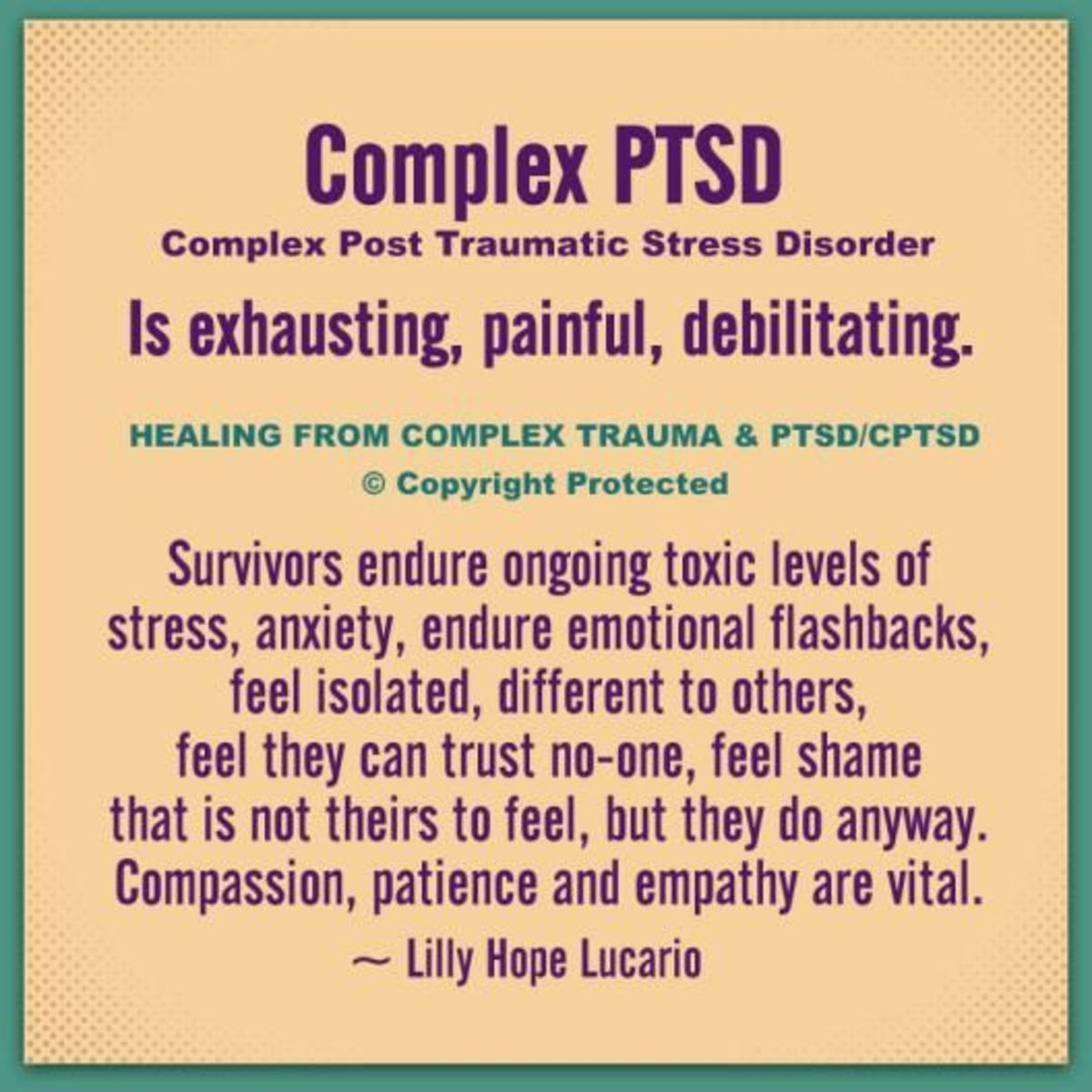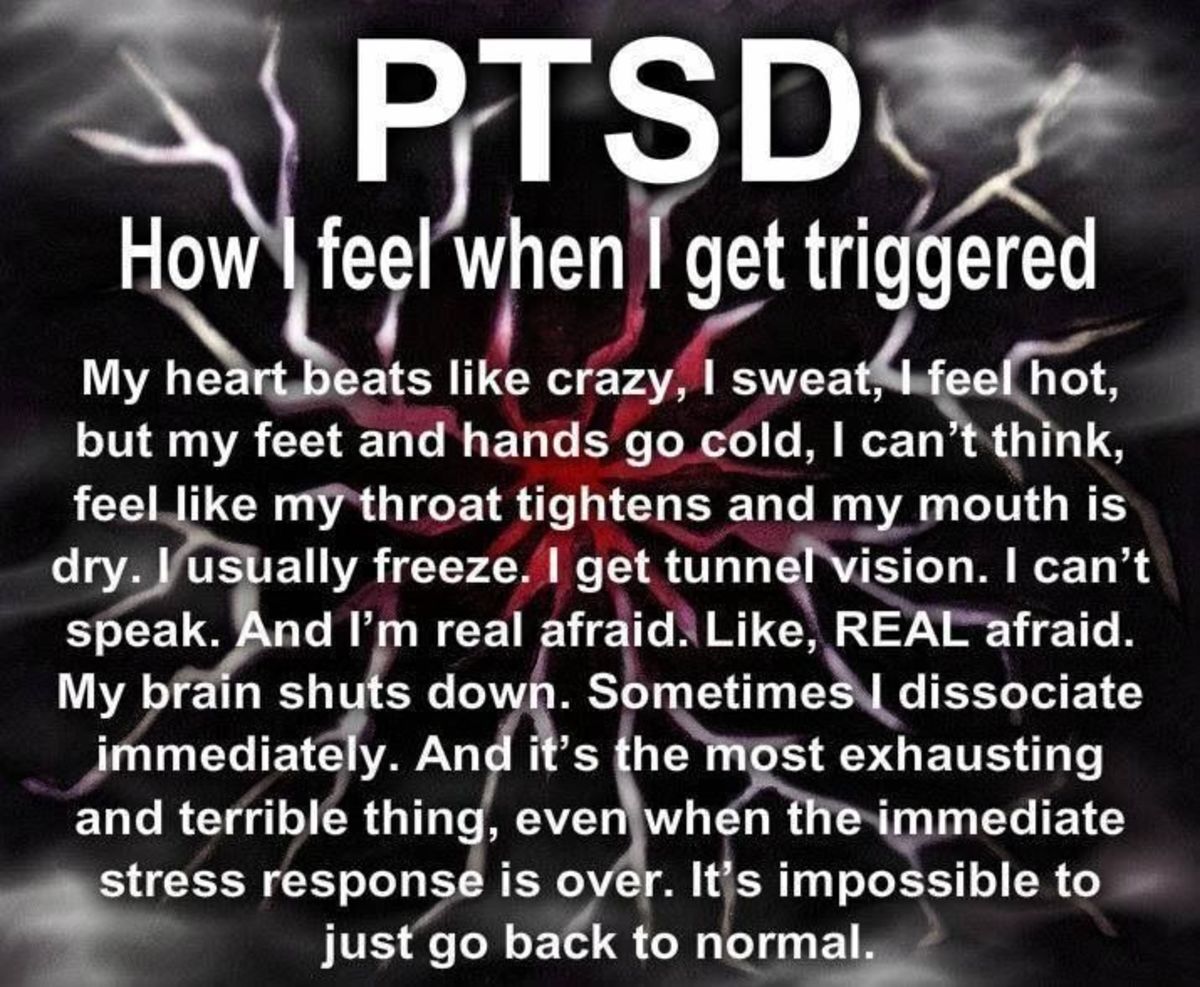- HubPages»
- Health»
- Mental Health»
- Anxiety Disorders
Shellshocked: Living With PTSD in a Traumatized World

Just about everyone has experienced, at one time or another, some harmful or potentially traumatic experiences during the course of our lives. Some of us seem very resilient in the face of these occurrences while others of us can become quite overwhelmed by them, even in some cases losing our ability to function effectively for what may become long periods of time. Sometimes these harmful experiences can seem to cause a sort of paralysis in which we become afraid to assert ourselves or otherwise participate in our usual social circles, which can increase our feelings of alienation from our former lives and make it more difficult to get back into a positive daily routine after a traumatic experience.
As the world we live in is subjected to ever more frequent disasters both natural and man-made, how can we protect ourselves and our families from the natural consequences of experiencing the psychological and emotional effects of these disasters and the ripple effects of their toxic fallout?
First, I think we need to understand how a harmful experience can cause someone to lose themselves and their sense of purpose in the strong rip-tide of a traumatic personal experience. In the immediate aftermath of a powerfully negative life experience it is important to do one's best to avoid the occurrence of two particularly harmful tendencies. The first of these is self-isolation, and the second is self-neglect. If a person can avoid these tendencies in the immediate aftermath of a traumatic event they are much more likely to successfully avoid more harmful patterns of behavior in the longer term.
After a traumatic experience, many people may fall into a habit of self-isolation. This behavior pattern may be the result of a sense that formerly supportive people may not be able to understand the feelings related to the new experience with which the person is trying to come to terms. A traumatized person may feel that people who used to be able to relate to and understand them may no longer be able to do so as a result of their new experience. The person may therefore fear being rejected or misinterpreted by important people in their lives. The affected person may themselves feel that they don't understand the feelings or psychological after effects they're experiencing in the wake of an event, and may be unable to imagine the possibility of others understanding those thoughts or feelings.
In addition, a person may feel guilty about the ways they handled themselves during or immediately after the experience and may fear being judged by those they care about if they admit to reacting in certain ways. Since the difficult experiences are fresh in the survivor's mind and are likely taking up a good deal of the person's conscious attention, the survivor may have a fear of initiating or participating in a discussion about the things most on their mind while simultaneously feeling uninterested in or unable to engage in discussions on other topics.
Another difficulty in the immediate aftermath of a difficult experience is self-neglect. Self-neglect may result from a diminished sense of self importance. A person who has gone through a traumatic event in recent memory may spend a lot of time thinking about the event and may forget to think about tasks associated with daily living. Or when the person does think about those tasks, focusing attention on those tasks may seem prohibitively self-indulgent. Or the subject may feel a sense of not having enough time to do all the things they want to do, and may begin to think of tasks associated with personal upkeep as wastes of what precious time they do have.
In the end the recently traumatized person may fail to accomplish many of the tasks which make up their basic routine and may also fail to accomplish anything else they wanted to accomplish, instead spending a majority of their time in deep and unproductive thought, or in worse cases engaging in actively self-destructive activities.
As we travel through the uncertain times which our planet, our communities, and all of us as individuals are faced with today, if we notice ourselves beginning to suffer from self-isolation or self-neglect there are some things we can do about it.
If we are having trouble with self-isolation, we must fight the urge to self-isolate and find some way to break the ice and participate again in the social circles which are important to us. This doesn't have to mean actively pursuing discussions revolving around the subject or subjects which are most troubling us, but it does mean getting involved in some kind of discussions, somehow. If, for one reason or another, we find it impossible to enter into interactions with our closest friends, we need to find a way to get involved in other social circles for a while, until we can comfortably interact with those who are closest to us again.
Trauma and Recovery by Judith Herman
A great treatment for both self-isolation and self-neglect is adopting what Judith Herman, in her excellent book Trauma and Recovery, has called a survivor's mission. The idea is for people affected by harmful experiences to dedicate themselves to a purpose or purposes they see as greater than themselves, which gives us a good reason to accomplish tasks associated with personal upkeep, because we must take care of ourselves in order to take on issues we see as greater than ourselves.
Personal upkeep may take a back seat to our desires to solve social or environmental problems, but the drive we experience to effectively address those larger issues which we are passionate about ensures that the personal upkeep does get done.

Our survivor missions can help get us past a sense of apathy towards what we may see as the growing meaningless of our own lives in the wake of trauma, until we can come back to the events at a later time in our lives when we are more capable of processing our experiences and their meanings to us. Adopting a survivor's mission also usually forces us to interact with others in order to cooperatively achieve shared goals. This helps us survive negative experiences both as individuals and as active agents of the greater good, working together towards a better world.
Do you sometimes feel as if getting out of bed or making yourself something to eat is more effort than it's worth? Think of something in the world around you that you feel strongly about - it could be anything from promoting awareness of carcinogens to fighting misogyny to volunteering at a no-kill animal shelter - and put your effort into that. If you don't feel important, throw yourself into working on something that is. The getting out of bed and eating will follow - and maybe, just maybe - so will a better world.








